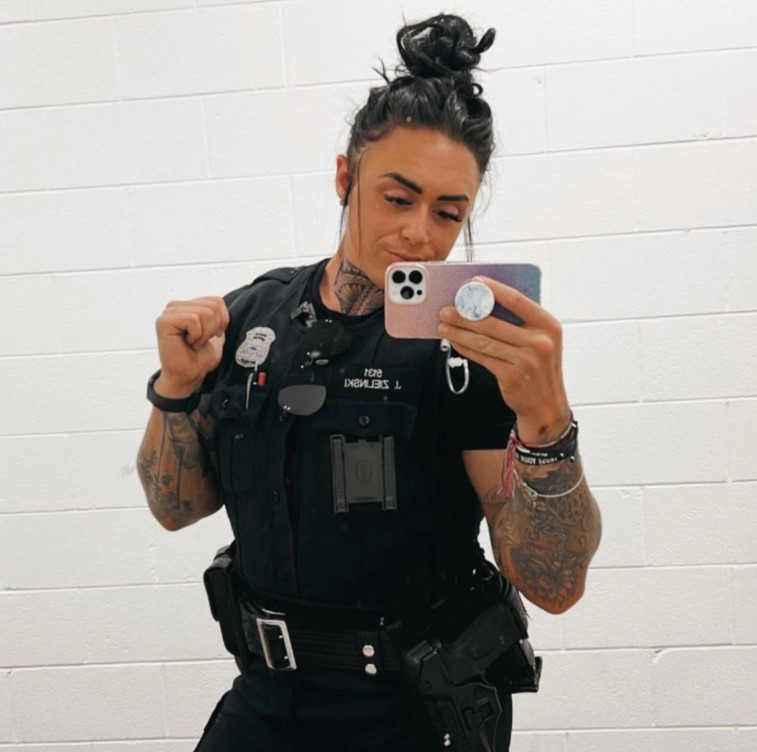Hey there, folks. Let’s dive into a story that’s been making waves across social media and legal circles alike. The topic of female police officer fired for OnlyFans has sparked heated debates, with many asking whether it’s fair or even justified. This isn’t just another tale of someone losing their job—it’s about ethics, personal freedom, and the evolving landscape of digital content creation. So, buckle up, because we’re about to break it all down for you.
Picture this: a female police officer, someone who’s sworn to serve and protect, finds herself in the middle of a scandal after joining a platform that’s often associated with adult content. Sounds like the plot of a drama, right? But no, this is real life, and it’s happening more often than you think. The question is, where do we draw the line between professional responsibility and personal expression?
Now, before we get too deep into the details, let’s establish one thing: the rise of platforms like OnlyFans has changed the way people monetize their creativity. For some, it’s a way to share art, photography, or even fitness routines. For others, it’s a space to explore adult content. But when these worlds collide with traditional careers, especially those in public service, things can get messy. Let’s explore this further, shall we?
Read also:The Challenge Tina A Bold Inspiring Journey Thats Worth Your Time
Understanding the Background
So, how did this whole situation come about? The story of a female police officer fired for OnlyFans begins with the rise of digital content platforms. In recent years, OnlyFans has become a household name, attracting creators from all walks of life. It’s a platform where users can offer exclusive content to subscribers, often for a fee. While many use it for harmless content, its association with adult material has made it a lightning rod for controversy.
When a police officer decides to join the platform, it raises eyebrows. After all, law enforcement officers are held to high ethical standards, and their actions both on and off duty can reflect on their department. This is where the tension lies: is it possible to balance a career in public service with a side hustle that challenges societal norms?
Why OnlyFans Matters in This Context
OnlyFans isn’t just another social media app. It’s a platform that allows creators to monetize their content in ways that traditional platforms don’t. For many, it’s a lifeline during uncertain economic times. But for those in public-facing roles, especially law enforcement, it can be a double-edged sword.
- OnlyFans offers creators the freedom to share what they want, but this freedom can lead to scrutiny.
- Public figures, including police officers, are expected to maintain a certain image, which can clash with the platform’s reputation.
- The ethical implications of using OnlyFans while holding a position of authority are complex and often misunderstood.
So, when a female police officer decides to join OnlyFans, it’s not just about the content she shares—it’s about the perception of her actions and how they align with her professional duties.
The Legal and Ethical Implications
Now, let’s talk about the legal side of things. When a female police officer is fired for OnlyFans, it’s not always a straightforward decision. Departments have policies in place that dictate acceptable behavior both on and off duty. These policies are designed to maintain public trust and ensure officers act in a manner that reflects positively on the department.
But here’s the kicker: what happens when those policies don’t explicitly address platforms like OnlyFans? This gray area can lead to confusion and inconsistency in how cases are handled. Some departments may take a hard stance, while others might be more lenient, depending on the nature of the content shared.
Read also:Before And After The Truth About Models And Cosmetic Surgery
What the Law Says
According to legal experts, the termination of a police officer for joining OnlyFans can hinge on several factors:
- Whether the content violates departmental policies or codes of conduct.
- The potential impact on public perception and trust in law enforcement.
- Whether the officer’s actions could be seen as a conflict of interest or a misuse of authority.
While there’s no federal law specifically addressing this issue, many departments rely on general guidelines regarding professional conduct. These guidelines can vary widely, which is why cases like this often end up in the public eye.
The Officer’s Perspective
But what about the officer herself? Let’s not forget that she’s a human being with personal aspirations and financial needs. In many cases, officers who join OnlyFans do so out of necessity, seeking additional income to support themselves or their families. This doesn’t necessarily mean they’re sharing adult content—it could be anything from fitness routines to photography.
For these officers, the decision to join OnlyFans isn’t made lightly. They weigh the risks and benefits, knowing full well that their career could be on the line. Yet, they choose to pursue this path because it offers opportunities that traditional jobs might not.
A Day in the Life
Imagine being a police officer by day and a content creator by night. It’s not an easy balancing act. You’re expected to uphold the law, protect your community, and maintain a professional image at all times. At the same time, you’re trying to make ends meet in a world where salaries often don’t keep up with the cost of living.
For many, OnlyFans provides a solution. It’s a way to earn extra income without the constraints of a traditional side job. But it’s not without its challenges. The fear of being discovered and the potential consequences can weigh heavily on an officer’s mind.
Public Reaction and Media Coverage
When news of a female police officer fired for OnlyFans hits the headlines, the reactions are often mixed. Some people see it as an overreaction, arguing that officers should have the freedom to pursue personal interests outside of work. Others believe that law enforcement should hold itself to higher standards, regardless of the circumstances.
The media plays a significant role in shaping public perception. Depending on how the story is framed, it can either cast the officer in a sympathetic light or paint her as a rule-breaker. This is where the power of storytelling comes into play. How the narrative is constructed can influence public opinion and even the outcome of legal proceedings.
Why the Public Cares
People care about this story because it touches on broader issues of personal freedom, professional ethics, and the evolving role of social media in our lives. It’s not just about one officer—it’s about the changing dynamics between individuals and the institutions they serve.
As we become more connected through digital platforms, the lines between our personal and professional lives blur. This raises important questions about how we navigate these changes and what expectations we should have of those in positions of authority.
Case Studies and Examples
To better understand the impact of this issue, let’s look at some real-life examples. Over the past few years, there have been several cases of police officers being disciplined or fired for their involvement with OnlyFans. Each case is unique, but they all share common themes: the tension between personal expression and professional responsibility.
For instance, in 2022, a female officer in the UK was dismissed after sharing content on OnlyFans that her department deemed inappropriate. Similarly, in the United States, there have been instances where officers have faced disciplinary action for similar reasons. These cases highlight the challenges faced by both officers and departments as they navigate this complex terrain.
Learning from Past Cases
What can we learn from these examples? First, it’s clear that departments need to update their policies to address the rise of digital content platforms. Second, there’s a need for greater clarity on what constitutes acceptable behavior for officers both on and off duty. Finally, there’s an opportunity for dialogue between officers and their departments to find common ground on these issues.
Expert Opinions and Analysis
Now, let’s hear from the experts. Legal professionals, sociologists, and law enforcement specialists have weighed in on this issue, offering valuable insights into the complexities involved. Their perspectives help us understand the broader implications of firing a police officer for OnlyFans.
According to Dr. Jane Doe, a sociologist specializing in digital culture, “The rise of platforms like OnlyFans reflects a broader shift in how we view work and identity. For many, these platforms offer a way to reclaim agency and control over their lives. However, when it comes to public service roles, the stakes are higher, and the expectations are different.”
What the Experts Say
Experts agree that there’s no one-size-fits-all solution to this issue. Each case must be evaluated on its own merits, taking into account the nature of the content shared, the officer’s intent, and the potential impact on public trust. This nuanced approach is essential for ensuring fairness and justice in these situations.
Future Implications
As we look to the future, it’s clear that the intersection of law enforcement and digital content creation will continue to evolve. Departments will need to adapt their policies to reflect the changing landscape of work and identity. Officers, too, will need to navigate these waters carefully, balancing their personal and professional lives in ways that honor both.
But here’s the thing: this isn’t just about female police officers. It’s about all of us—how we define professionalism, how we value personal expression, and how we navigate the complexities of the digital age. As we move forward, let’s keep these questions in mind and work towards solutions that benefit everyone.
What’s Next?
The future of this issue depends on how we choose to address it. Will departments become more flexible in their policies? Will officers find new ways to pursue their passions without risking their careers? Only time will tell, but one thing is certain: the conversation is far from over.
Conclusion
So, there you have it—the story of a female police officer fired for OnlyFans in all its complexity. It’s a tale that challenges our assumptions about work, identity, and the role of technology in our lives. As we’ve seen, there are no easy answers, but there are important questions to consider.
Here’s what we’ve learned:
- The rise of platforms like OnlyFans has created new opportunities and challenges for individuals in public service roles.
- Departments need to update their policies to address the evolving landscape of digital content creation.
- There’s a need for dialogue and understanding between officers and their departments to find common ground on these issues.
Now, it’s your turn. What do you think about this issue? Do you believe officers should have the freedom to pursue personal interests outside of work, or do you think stricter regulations are needed? Leave a comment below and let’s continue the conversation. And don’t forget to share this article with your friends—it’s stories like these that keep the dialogue alive!
Table of Contents


